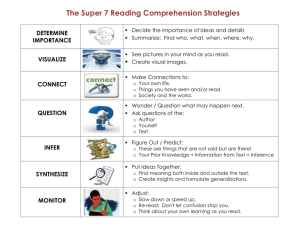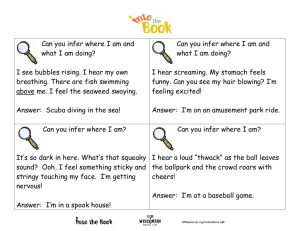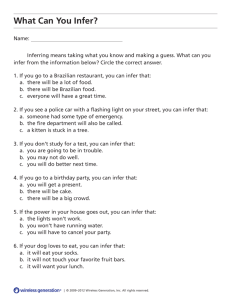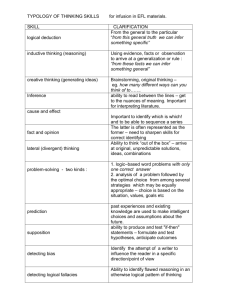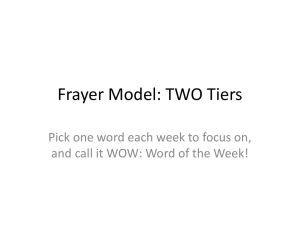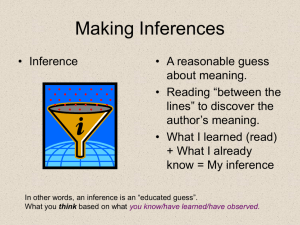Daily Academic Vocabulary Week Ten
advertisement
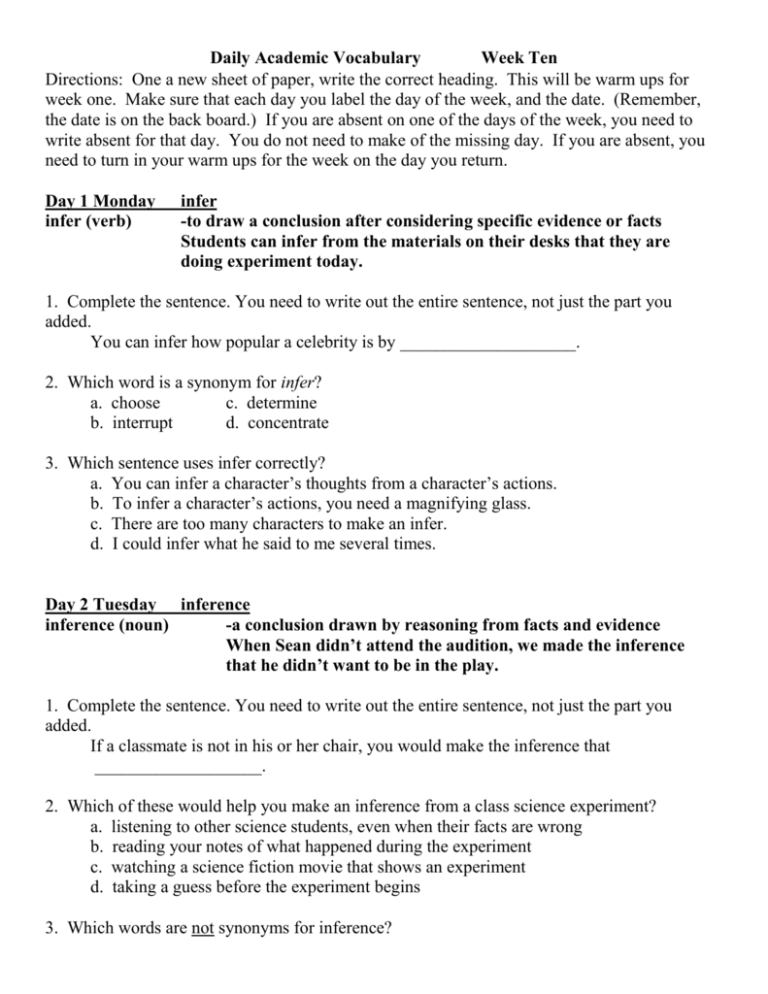
Daily Academic Vocabulary Week Ten Directions: One a new sheet of paper, write the correct heading. This will be warm ups for week one. Make sure that each day you label the day of the week, and the date. (Remember, the date is on the back board.) If you are absent on one of the days of the week, you need to write absent for that day. You do not need to make of the missing day. If you are absent, you need to turn in your warm ups for the week on the day you return. Day 1 Monday infer (verb) infer -to draw a conclusion after considering specific evidence or facts Students can infer from the materials on their desks that they are doing experiment today. 1. Complete the sentence. You need to write out the entire sentence, not just the part you added. You can infer how popular a celebrity is by ____________________. 2. Which word is a synonym for infer? a. choose c. determine b. interrupt d. concentrate 3. Which sentence uses infer correctly? a. You can infer a character’s thoughts from a character’s actions. b. To infer a character’s actions, you need a magnifying glass. c. There are too many characters to make an infer. d. I could infer what he said to me several times. Day 2 Tuesday inference inference (noun) -a conclusion drawn by reasoning from facts and evidence When Sean didn’t attend the audition, we made the inference that he didn’t want to be in the play. 1. Complete the sentence. You need to write out the entire sentence, not just the part you added. If a classmate is not in his or her chair, you would make the inference that ___________________. 2. Which of these would help you make an inference from a class science experiment? a. listening to other science students, even when their facts are wrong b. reading your notes of what happened during the experiment c. watching a science fiction movie that shows an experiment d. taking a guess before the experiment begins 3. Which words are not synonyms for inference? a. conclusion b. judgement Day 3 Wednesday surmise (verb) c. boredom d. correction surmise -to draw a conclusion without certain knowledge; suppose I surmise that we will go on vacation this year, but my parents haven’t said anything yet. 1. Complete the sentence. You need to write out the entire sentence, not just the part you added. I surmise that I will study ____________ in _____________ next year. 2. In which situation would it not be a good idea to surmise? a. wondering what is for dinner b. thinking about the next episode of a favorite TV show c. choosing the correct answer to a math problem d. taking money to the store to buy a specific book 3. Which sentence uses surmise correctly? a. The students surmise what the teacher told them. b. I surmise that we will play soccer, since the soccer balls are out. c. My birthday party was a great surmise. d. I surmise that our next test will be difficult. 4. Do you understand the concept of academic vocabulary? What is it? Day 4 Thursday contemplate contemplate (verb) -to think about deeply and seriously The teacher will contemplate the students’ suggestions. 1. Complete the sentence. You need to write out the entire sentence, not just the part you added. One important decision I contemplate was _______________________. 2. Which of these would you contemplate? a. how to help a friend b. what to wear to school c. what to eat for lunch d. how to ride a bicycle 3. Which sentence does not use contemplate correctly? a. Betsy will contemplate long and hard before deciding on a science fair project. b. Let’s contemplate at the playground before the game. c. The main character in the story had to contemplate before choosing a course of action. d. Please consider all the options when you contemplate your decision. Day 5 Friday infer inference surmise contemplate Take the mini quiz and then turn in your warm ups for the week. 1. Which statement is correct? A. When you infer, you use your imagination to create ideas. B. The best way to infer is to make a guess. C. Good observation skills can help you infer something. D. Knowing facts does not help you to infer. 2. In which sentence could inference be used to fill in the blank? A. An _________ is a sentence that ends in a question mark. B. You can make an _________ about the subject of a book from its title. C. You can _________ to get an idea of how much something will cost. D. An _________ is a picture or drawing. 3. If you surmise something, which of the following explains what you do? A. think about it B. figure it out using evidence C. get it wrong D. suppose 4. When you contemplate, which of the following do you not do? A. be silly B. take your time C. consider carefully D. think seriously Mini Quiz
